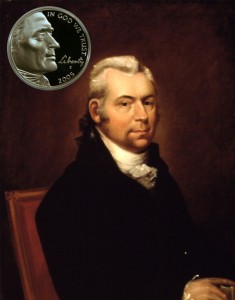Today, the Jefferson Nickel Coin remembers the letter written by Thomas Jefferson to Gideon Granger discussing potential positions in the government and the stiff surety bond requirement.
=====
To Gideon Granger
Washington, October 14, 1801.
Dear Sir,
Since my letter of October 7, the question as to the public offices has taken a turn different from what was then expected.
Neither of the two then named is to be vacant, but instead thereof the Postmaster general’s place.
This being of equal grade, emolument, and importance, I propose it to your acceptance with the same satisfaction as either of the others.
Perhaps you will consider it as more eligible than the treasury, as that would have obliged you to call on your friends to become your sureties for 150,000 D. that being the sum fixed by law.
Judging of the feelings of others by my own, this would not have been pleasant.
Let me hear from you immediately, while the same reserve as to others is kept up.
Health and affectionate respect.
Thomas Jefferson
=====
What was this surety bond to which the relatively new President Jefferson referred?
First, let’s review the definition of a surety bond:
A surety bond or surety is a promise by a surety or guarantor to pay one party (the obligee) a certain amount if a second party (the principal) fails to meet some obligation, such as fulfilling the terms of a contract. The surety bond protects the obligee against losses resulting from the principal’s failure to meet the obligation.
Next, what was the law?
In the United States Statutes at Large from 1789, the law of September 2 was An Act to Establish a Treasury Department.
Section 1 summarized:
Be it enacted by the Senate and House of Representatives of the United States of America in Congress assembled, That there shall be a Department of Treasury, in which shall be the following officers, namely: a Secretary of the Treasury, to be deemed head of the department; a Comptroller, an Auditor, a Treasurer, a Register, and an Assistant to the Secretary of the Treasury, which assistant shall be appointed by the said Secretary.
Further, Section 4 described the duties of the Treasurer and included the following requirement:
He shall, at all times, submit to the Secretary of the Treasury, and the Comptroller, or either of them, the inspection of the monies in his hands; and shall, prior to the entering upon the duties of his office, give bond, with sufficient sureties, to be approved by the Secretary of the Treasury and Comptroller, in the sum of one hundred and fifty thousand dollars, payable to the United States, with condition for the faithful performance of the duties of his office, and for the fidelity of the persons to be by him employed, which bond shall be lodged in the office of the Comptroller of the Treasury of the United States.
As President Jefferson stated, the first obligation of the person in the Treasurer’s position was to find friends that would sign a surety bond of $150,000.
Just how difficult would it be to find friends that would promise to pay if you did not perform your duties properly?
And, who defines “properly?”
Was it just to insure against embezzlement, or was the surety bond for a broader list of performance failures?
Mr. Granger, a staunch supporter of Jefferson’s platform, accepted the President’s appointment as Postmaster General and served from 1801 to 1814.
As of today, he remains the longest serving Postmaster General in history.
The Jefferson Nickel Coin shows against a portrait of Gideon Granger.
